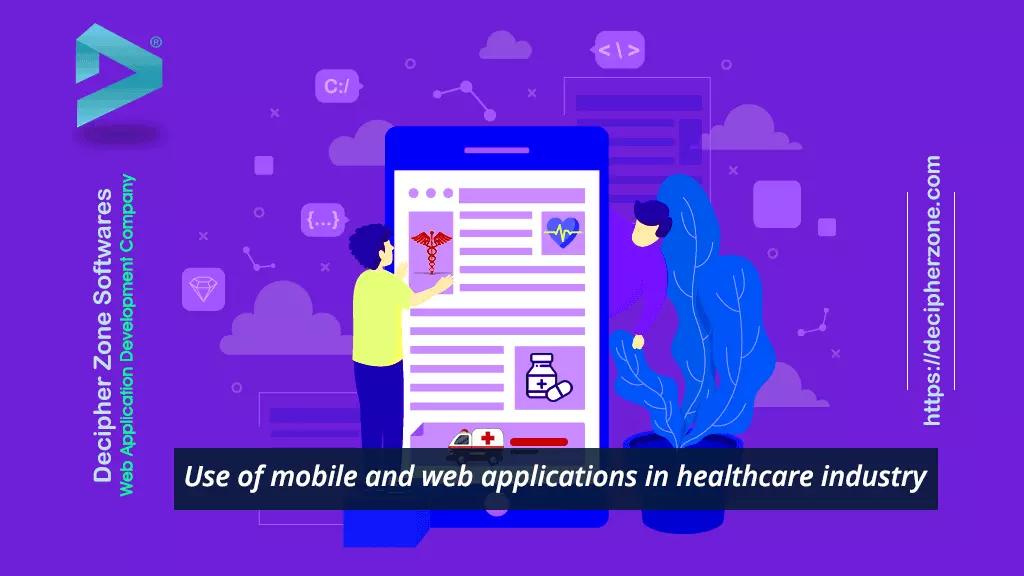Mobile and web applications have become an inevitable part of our life and it has been disrupting the industries for a while but we never realized what it has done for the healthcare industry and what it can do in near future.
Top 10 ways of how mobile and web applications impacted the healthcare industry
Use of mobile and web applications in the healthcare industry.
1. Surgical assistance with augmented reality
Augmented Reality and VR headsets were just the beginning, the real groundbreaking technology is a mixed reality that was introduced by Microsoft with HoloLens. Now the software industry is working to develop apps like Vuforia View for the healthcare industry which could help doctors with the magnification of small human organs and assistance in surgery.
2. CAD for Dentists
Common problem dentists face is that they have cases where dental implants are required, so if the size of implanted teeth is not of the right size it scorches the neighboring teeth of the patient and damages them over a period of time. The solution to this problem was to use CAD software for designing the required dental implant and send it to manufacturer's laboratory. Exocad and 3Shape are two software of this kind which is not too popular at the moment as they have a hefty price tag.
3. Remote consultation with Doctors
Access to quality healthcare and doctors has always been a concern in developing countries and remote areas. To resolve this, remote consultation’s approach was adopted that brought the healthcare industry to the shores of mobile and web application development companies. Practo is one such example and now doctors are even consulting patients through video calling apps.
4. Online Pharmacies
Access to good quality medicine is limited because of either the unavailability of medicine in the vicinity of the high retail price. Online pharmacies help patients to identify their disease by analyzing their symptoms, offering them the home delivery of their demanded medicine and suggesting them alternatives to that medicine in case it is unavailable of expensive for them. In a way, it can be said online pharmacies tied a bridge to ensure the right to healthcare.
5. Maintaining health records of patients
Managing healthcare records of regular checkups is a pretty hefty task, forget about perfectly maintaining records of patients who suffer from a terminal illness. Mobile and web applications can be used to maintain healthcare records for effective collaboration between doctors, insurance companies and patients. Since these records are being stored on shared hosting services so it can be accessed from anywhere and it is unlikely that you would lose your records.
6. Real-Time Insurance Claim and Verification
When an insurance company maintains medical records of patients on mobile and web applications then these can be shared between medical practitioners. If a patient is prescribed a treatment then the patient can claim this record through the application and the company can request the verification of prescription in real-time and settle the claims within 24 hours. The approach will not only improve the service for patients but it will increase the number of associated medical partners.
7. Predictive analysis of patients’ health
If a company has complete healthcare records of volunteers then their data can be fed to machine learning training models and engines for predictive modelling. The accuracy of these models is directly proportional to the training they get. These models will be able to predict the potential health risks to a patient a lot earlier so that they could take the preventive measures and live a long healthy life.
8. Inventory Management in hospitals
Medicines and medical kits expire in Inventories of hospitals even when they could be consumed earlier instead of the stock that has a longer expiry date. The expiring stock reflects huge loses on balance sheets and increasing their expense. The use of mobile and web applications for inventory management in hospitals can help to reduce the operational costs of hospitals and provides them with the opportunity to offer healthcare services on a highly competitive price. The scenario will turn out to be a win-win situation for hospitals and patients.
9. Monitoring Patients with IoT
Smart Bands, Apple watch, smart shoes, T-shirts and mobile phones are a couple of devices that we have been using for mapping and monitoring our health. Now the idea that’s gaining popularity is to use mobile and web applications to send notifications to hospitals and doctors when a trigger is hit by the reading of connected smart bands and watches.
Imagine if a patient is registered with an insurance company and he/she is using a mobile application and an IOT device that reads heartbeats. An absolutely abnormal reading will send notification and personal details of the patient to all the partner hospitals of the insurer.
10. Blood Bank Logistics Management with IoT
Little or no availability of blood in critical medical cases has taken thousands or maybe millions of lives. This issue is omnipresent on every geographical location because sometimes the distance to the blood bank is too much or sometimes the delivery is delayed by denser traffic conditions. There’s one startup called Zipline that has been saving lives in Rwanda and Ghana by medical products and blood delivery system with drones. All hospitals have to do is to request the required medical product on mobile or web application and the company will deliver the product within an hour.

